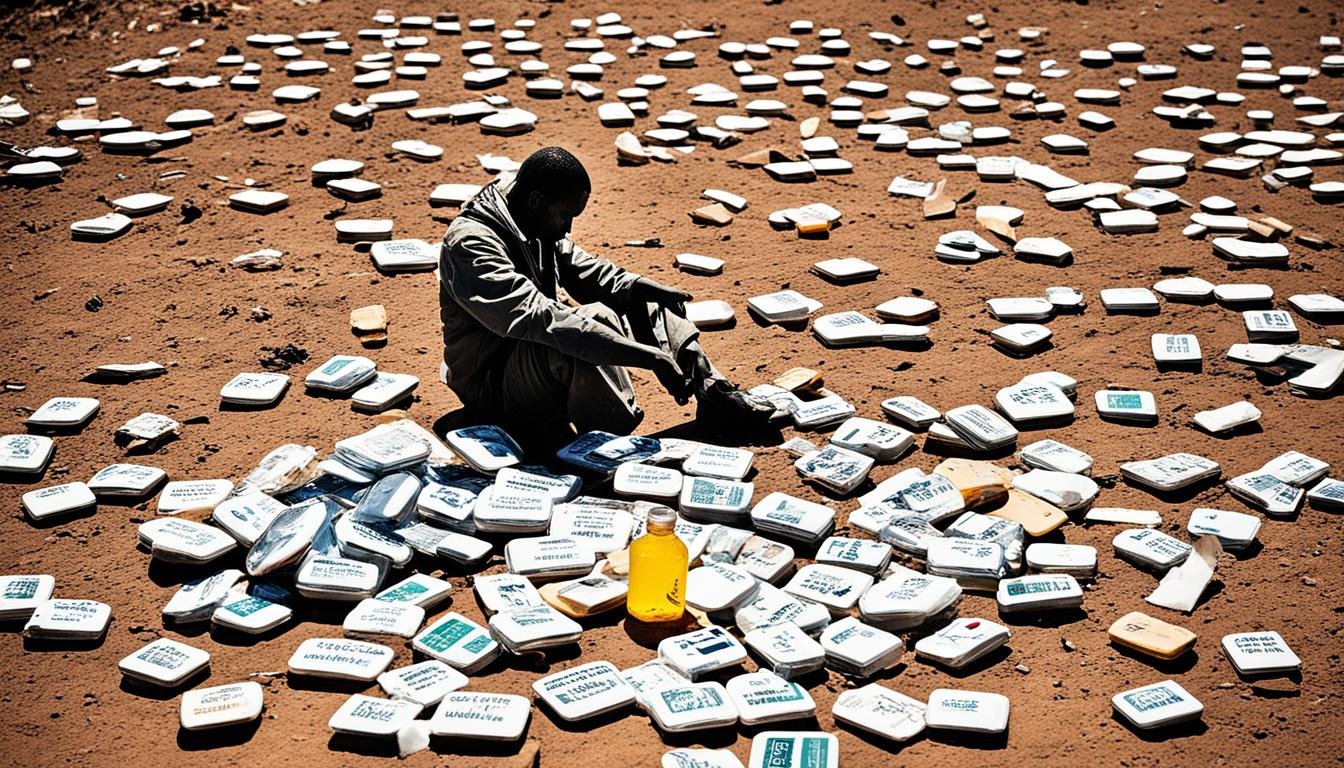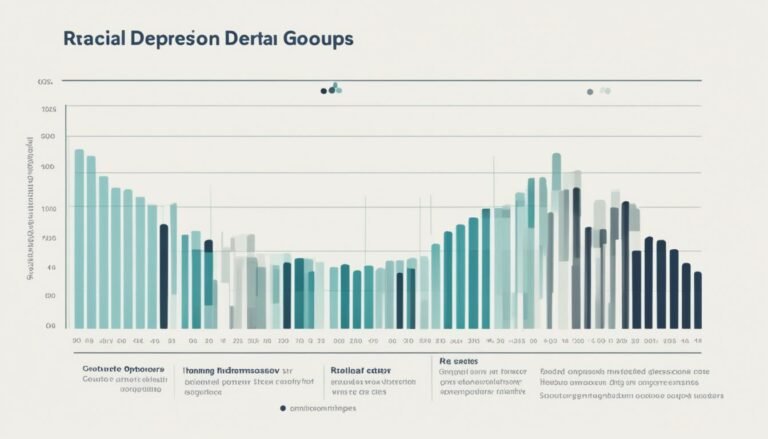What are the barriers to mental health in Africa?
Poor access to mental health care, limited resources, stigma, and cultural beliefs are among the significant barriers to mental health in Africa. These challenges contribute to mental health disparities and hinder the prevention and treatment of mental illnesses across the continent.
African countries face a lack of government investment in mental health, with per capita funding falling well below the recommended amount. This inadequate funding leads to a scarcity of mental health resources and services, making it difficult for individuals to access the care they need.
Furthermore, the underappreciation of the disease burden due to the lack of data on mental health exacerbates the problem. Without accurate statistics, the scale of mental health challenges in Africa is not fully recognized, resulting in a continued underprioritization of mental health care.
In addition to financial constraints, stigma and cultural beliefs pose significant barriers to mental health access. Many people in Africa face stigmatization when seeking help for their mental health, leading to fear, shame, and reluctance to disclose their condition. Limited mental health education further perpetuates the stigma and prevents individuals from seeking appropriate care.
Key Takeaways:
- Poor access to mental health care and limited resources are major barriers to mental health in Africa.
- The underappreciation of the disease burden due to a lack of data hinders efforts to prioritize mental health care.
- Stigma and cultural beliefs surrounding mental health prevent individuals from seeking help and disclosing their condition.
- Investing in mental health education and destigmatization efforts is crucial to improving access to care.
- African governments need to prioritize mental health funding and allocate sufficient resources to address the challenges.
Why is Mental Health Care Underprioritized in Many African Countries?
Mental health care in many African countries faces significant underprioritization due to a combination of factors. One of the key reasons is inadequate funding, compounded by competing health and development priorities. African governments allocate minimal resources to mental health, resulting in underfunded and understaffed mental health services. According to WHO, the majority of African nations allocate less than 1% of their national health budgets to mental health.
The lack of data on mental health further contributes to underappreciation of the disease burden and impacts the prioritization of mental health care. Insufficient data hampers the understanding of the prevalence and impact of mental illnesses, making it challenging for policymakers to make informed decisions and allocate appropriate resources. As a result, mental health care remains low on the list of priorities for governments and health systems.
Additionally, the high disease burden of mental illnesses in African countries is often underestimated and overlooked, leading to a lack of urgency in addressing this critical health issue. The World Health Organization estimates that neuropsychiatric conditions contribute to 7.6% of the total disability-adjusted life years (DALYs) in Africa. Despite this significant burden, mental health care receives limited attention, resources, and funding.
| Barriers to Mental Health Care in African Countries | Impact |
|---|---|
| Inadequate funding | Limited resources, understaffing, and poor infrastructure |
| Lack of data | Underappreciation of the disease burden, insufficient understanding of mental health prevalence and impact |
| Underestimation of mental illness burden | Lack of urgency in addressing mental health as a critical health issue |
Addressing the underprioritization of mental health care requires a multi-faceted approach involving increased funding, improved data collection and analysis, and raising awareness about the burden of mental illnesses. By investing in mental health and prioritizing its inclusion in healthcare systems, African countries can begin to bridge the gap and ensure that adequate care and support are accessible to those in need.
What are the barriers to accessing mental health care in Africa?
Mental healthcare in sub-Saharan Africa faces several barriers that limit access to care and perpetuate inequalities. Treatment costs, limited mental health education, stigma, and cultural beliefs all contribute to the challenging landscape of mental healthcare in the region.
Treatment Costs
The cost of mental health treatment poses a significant barrier for many individuals in sub-Saharan Africa. The high cost of medications, therapy sessions, and hospitalization can be prohibitive, especially for those with limited financial resources. As a result, individuals may go untreated or seek alternative, often inadequate, methods of care, such as relying on traditional healers or religious leaders.
Limited Mental Health Education
A lack of comprehensive mental health education further hampers access to care in sub-Saharan Africa. Limited awareness and understanding of mental health disorders among the general population, as well as healthcare professionals, hinder early recognition of symptoms and appropriate intervention. The lack of mental health literacy perpetuates misconceptions and perpetuates stigma surrounding mental illnesses.
Stigma and Cultural Beliefs
Stigma surrounding mental health remains a significant barrier in sub-Saharan Africa. Negative attitudes and beliefs towards mental illness contribute to discrimination, social exclusion, and prejudice. These deeply entrenched stigmas can prevent individuals from seeking help, disclosing their mental health condition, or accessing mental healthcare services. Cultural beliefs and practices, which sometimes attribute mental illness to supernatural causes, also impact help-seeking behaviors and acceptance of evidence-based treatments.
“The barriers to accessing mental healthcare in sub-Saharan Africa are complex and interconnected. Treatment costs, limited mental health education, and the stigma surrounding mental illness all contribute to the challenges individuals face when seeking help for their mental health concerns.”
Overcoming these barriers requires a holistic approach that addresses the interplay of socio-cultural, economic, and systemic factors. Efforts are underway to promote mental health awareness, reduce stigma, and increase access to affordable and high-quality mental healthcare services across sub-Saharan Africa.

This image highlights the barriers to accessing mental health care in Africa, including treatment costs, limited mental health education, stigma, and cultural beliefs. It serves as a visual representation of the challenges individuals face in seeking mental health support.
How can these challenges be overcome and what achievements have been made?
Overcoming mental health challenges in Africa requires innovative approaches and dedicated organizations that prioritize improving mental health care. One such approach is group interpersonal psychotherapy, which has been endorsed as a first-line intervention for vulnerable populations in low-resource settings.
One organization making significant achievements in mental health care is StrongMinds. Operating in Uganda and Zambia, StrongMinds has provided group talk therapy to over 160,000 depressed women and adolescents, resulting in remarkable improvements in their mental health.
StrongMinds goes beyond providing therapy and focuses on educating the public about depression. By raising awareness and reducing stigma surrounding mental health, StrongMinds aims to create a more supportive and understanding environment for individuals living with depression.
“Our goal is not only to treat the individuals but also to create a broader impact by fostering a society that prioritizes mental health,” says Dr. Dixon Chibanda, Founder of StrongMinds.
In addition to their direct interventions, StrongMinds collaborates closely with the Ministry of Health to advocate for the inclusion of people treated for depression in the health management system. By being recognized within the formal healthcare structure, individuals with depression are more likely to receive ongoing support and access to necessary resources.
Through their efforts, StrongMinds has demonstrated the effectiveness of group interpersonal psychotherapy in improving mental health outcomes and has paved the way for innovative approaches to tackling mental health challenges in Africa.
Table:
| Organization | Country | Population Reached | Achievements |
|---|---|---|---|
| StrongMinds | Uganda and Zambia | Over 160,000 depressed women and adolescents | Significant improvements in mental health |
What more can be done to improve mental health services in Africa?
Investing in mental health yields long-term benefits. By prioritizing mental health services, African countries can improve the well-being of their populations and potentially reduce the overall burden of mental illness. To achieve this, several key strategies should be considered:
- Accurate recording of mental illnesses: It is crucial to have an accurate and comprehensive recording of the number of people treated for mental illnesses in the Health Management System. This data serves as the foundation for informed decision-making, resource allocation, and planning for mental health services. Governments and healthcare providers must prioritize the accurate collection and analysis of this information.
- Educating the public: Addressing mental health stigma and improving access to care requires widespread awareness and understanding of mental health issues. Efforts should be made to educate the public about mental health signs, symptoms, and available resources. By fostering a supportive and informed society, individuals are more likely to seek help when needed and communities can work together to dismantle the barriers to mental health services.
- Building the knowledge base: There is a need for continued research and data collection on mental health in Africa. By expanding the knowledge base, healthcare professionals can better understand the specific challenges and needs of the population, leading to the development of targeted interventions and programs. This knowledge can also inform policy decisions and advocacy efforts, paving the way for more effective mental health services.
Together, these strategies can contribute to significant improvements in mental health services in Africa. By investing in accurate recording, educating the public, and building the knowledge base, African countries can take important steps towards overcoming the barriers to mental health care and providing the support and resources necessary for individuals to thrive.

Conclusion
The barriers to mental health care in Africa pose significant challenges, including limited resources, stigma, and cultural beliefs. These factors have contributed to poor access to mental health services and a lack of investment in mental health care. However, there have been notable achievements in improving access to care through innovative interventions such as group talk therapy.
Despite these achievements, there is still much work to be done to improve mental health services in Africa. Increased investment and funding are crucial to ensure the availability of adequate resources for prevention and care services. Accurate recording of mental illnesses is essential for informed decision-making and budget allocations. Improved data collection can help identify gaps in service provision and tailor interventions to meet the specific needs of different communities.
Furthermore, widespread education on mental health is vital to break down the barriers of stigma and cultural beliefs that hinder access to care. By raising awareness about mental health signs and symptoms and promoting mental health literacy, more individuals can seek help without fear of discrimination. Education campaigns can also highlight the importance of mental health and encourage individuals, families, and communities to prioritize their well-being.
Addressing these barriers requires a collaborative effort from governments, healthcare systems, NGOs, and communities. By investing in mental health, accurately recording mental illnesses, and promoting education, Africa can take significant steps toward improving the well-being of its population and reducing the burden of mental illness across the continent.
FAQ
What are the barriers to mental health in Africa?
The barriers to mental health in Africa include limited resources, stigma, and cultural beliefs that hinder access to care and prevention services.
Why is mental health care underprioritized in many African countries?
Mental health care is underprioritized in many African countries due to competing health and development priorities, inadequate funding, and a lack of appreciation for the disease burden.
What are the barriers to accessing mental health care in Africa?
Barriers to accessing mental health care in Africa include treatment costs, limited mental health education, stigma, and cultural beliefs that discourage seeking care or disclosing mental health conditions.
How can these challenges be overcome and what achievements have been made?
Interventions like group talk therapy have shown promising results in addressing mental health challenges in Africa. Organizations like StrongMinds have provided group talk therapy to depressed women and adolescents, achieving significant improvements in their mental health. These initiatives also focus on educating the public about depression and advocating for inclusion in the health management system.
What more can be done to improve mental health services in Africa?
To improve mental health services in Africa, there is a need for increased investment and funding, accurate recording of mental illnesses in the Health Management System, and widespread education on mental health signs and symptoms. These measures will help reduce stigma and improve access to care.
What is the conclusion?
The barriers to mental health care in Africa are significant, including limited resources, stigma, and cultural beliefs. However, achievements have been made through interventions like group talk therapy. To further improve mental health services, increased investment, accurate data recording, and education on mental health are necessary. By addressing these barriers, Africa can make significant strides in improving the well-being of its population and reducing the burden of mental illness.






